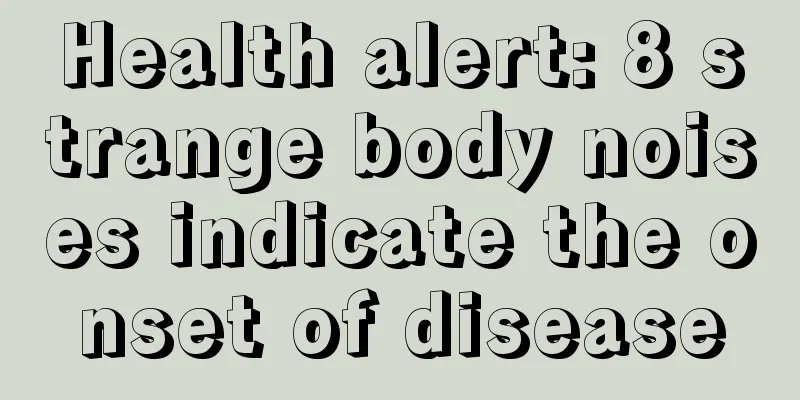Health alert: 8 strange body noises indicate the onset of disease

|
Sometimes the sounds your body makes can be health alerts. Learning to interpret different body sounds can help determine possible medical conditions and buy time for treatment. Sometimes our bodies detect sounds that shouldn’t be heard, and sometimes we curiously share them with our friends. Below are eight disease signals conveyed by "body sounds". If you hear these sounds in your body, don't take them lightly. 1. Habitual snoring at night: Beware of sleep apnea If you have the habit of snoring and heavy breathing during sleep at night, you may wake up covered in sweat. If you habitually snore at night or feel sleepy during the day, you may have sleep apnea. You should see a doctor as soon as possible because sleep apnea increases the risk of diabetes and stroke. Be careful of sleep apnea if you snore at night. Experts suggest that nasal sprays can help relieve snoring, but losing weight is more effective.
2. Buzzing or bell-like sounds in the ears: Be careful of otitis interna. The tinnitus actually comes from the brain, which misinterprets false electrical signals as noise. The cause may be inner ear damage. Therefore, it is best to wear earplugs in noisy environments. But if tinnitus persists and occurs in one ear, it is best to see a doctor. This may be due to an infection such as otitis interna.
3. Stomach pain accompanied by gurgling: Be careful of intestinal obstruction. Generally speaking, normal people will produce bowel sounds when digesting food. However, if bowel sounds are prominent and are accompanied by pain or swelling, especially if a sloshing sound is heard when the abdomen is pressed, a doctor should be consulted. Possible causes include fast or slow intestinal motility and, in rare cases, intestinal obstruction requiring surgical treatment .
4. Your nose makes a whistling sound: Be careful of nasal septum perforation. Nasal congestion can easily cause whistling noises in the nose. Blowing your nose, using steroid nasal sprays, etc. can help solve the problem. However, if whistling noises occur after a facial injury or if you pick your nose too vigorously, you should see a doctor immediately. This may be due to a perforated nasal septum, which may require surgery. 5. Clicking or popping sound in the jaw: beware of temporomandibular joint dislocation. If your jawbone is clicking or popping and the sound is loud and harsh, you may have a misaligned temporomandibular joint. But if you have a stiff jaw or are unable to open or close your mouth, you should see a doctor. If it is nocturnal bruxism, it will cause joint wear and tear and cause pain. 6. Cracking sound in knee and ankle joints: Watch out for meniscus tears, arthritis, or ligament strains. If a joint sounds unusual and is accompanied by pain, swelling, or stiffness, or if it affects movement, see a doctor immediately. Knee pain may be caused by a torn meniscus, while ankle pain may be caused by arthritis or a ligament strain.
7. Constant hiccups: be careful of gastrointestinal ulcers. Between the chest cavity and the abdominal cavity, there is a thick muscle membrane like a hat, which is the diaphragm. When stimulated by cold, full meals, eating too fast, eating dry and hard food, the diaphragm will experience paroxysmal and spasmodic contractions, and people will hiccup continuously. Short-term hiccups are also a protective reaction of the body, but if they occur continuously or are stubborn and difficult to heal, they may indicate diseases such as cholecystitis and peptic ulcer. In addition, bad psychological states such as tension and anger often cause hiccups. There is a little trick to distinguish whether hiccups are caused by an organic disease. If the hiccups can be relieved within 24 hours and stop automatically after falling asleep, they are mostly not caused by disease. However, if the hiccups continue to occur for more than 24 hours and do not stop even after falling asleep, they are mostly suffering from illness.
8. Joint crackling: Be careful of bone and joint diseases. Joint movement is restricted by fascia, ligaments, muscles and other tissues. There is a lubricating fluid in the joint cavity, which contains gas. When the joints move, the gas is squeezed out of the liquid, making a sound. When the joints are flexed and extended excessively, there is often a "pop" sound, which generally does not affect health. However, if the joints often pop and are accompanied by pain and movement disorders, you should be careful, as it may be bone and joint diseases such as tenosynovitis, bursitis, and meniscus injury. |
<<: Don't commit the six taboos when sleeping
>>: Put an apple in the potato to prevent it from sprouting. 5 tips for cooking potatoes
Recommend
What is the reason for sagging buttocks
Buttock sagging is also a common type of rectal p...
Will I burn fat if I don't eat when I'm hungry?
If the body does not have excess fat, it will not...
Can white wine and apricots be eaten together
People have to deal with liquor in their daily di...
What are the 4 methods for diagnosing central lung cancer?
Central lung cancer is the most common type of lu...
Is kidney cancer prone to recurrence after surgery?
Kidney cancer is already a common and fatal disea...
What are the symptoms and dangers of hyperlipidemia?
As people's living standards improve, meat an...
There are pimples on your face that you can't see?
Facial problems are very important to us, especia...
What are the fastest ways to get rid of acne scars?
Young boys and girls are in their prime, and it i...
Will big three positives turn into liver cancer? The harm of big three positives in liver cancer should be made clear
Many people may know that HBsAg can turn into liv...
Is cavernous hemangioma hereditary?
Hemangioma is a relatively common tumor that peop...
How is fresh peach gum processed?
Peach gum is actually the gum secreted by the tre...
How to treat superficial gastritis?
Gastric disease is a chronic disease. Generally, ...
What causes thick skin on feet and how to treat it?
Everyone's foot skin is relatively thick. Com...
How long can you live without treating kidney disease
The kidneys are very important organs in the huma...
What are the causes of prostate cancer? What are the causes of prostate cancer?
In the past, many male friends may have rarely he...









